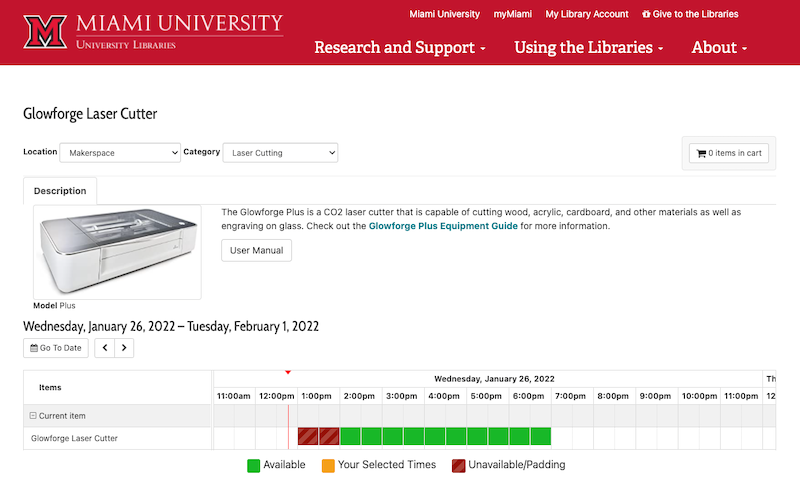
Emergency pandemic online services
Note: The services implemented for the pandemic have now become expected tools for our students. Indeed, our reservation systems have now expanded to multiple buildings across campus.
March 2020-May 2021
The Covid-19 pandemic posed a slew of challenges for providing equitable library services. How would in-person services translate online? How do we allow researchers and makers to make full use of the libraries while keeping everyone safe? We needed to quickly plan and implement several new and upgraded virtual services. For each of these projects I collaborated with staff to best understand their needs. I then focused not solely on the needed functionality, but on how our students and staff would interact with the functionality to eliminate as much friction as possible. Here are examples of the various projects required to keep our system running during Covid.
Appointment systems for Special Collections and University Archives
Because researchers are working with rare materials and nearly always need librarian/archivist assistance, I integrated a custom reservation form with conditional fields that allowed new researchers to seamlessly fill out the archives user agreement and for the researcher’s needs to be captured during the reservation process. This way the librarian/archivist is prepared when the researcher arrives. Collaborated with Alia Wegner and Tiffany Dogan.
Curbside pickup
We’ve long providedspace reservations for our study rooms, we just moved that space outside to our parking lot behind King Library. We implemented curbside pickup as an extension to patrons placing holds on items. When these holds are ready for pickup, they then make an timed appointment for the parking space where a library employee then brings out their selections.
Statistics Help Desk and Zoom integrations
The undergraduate-oriented Stats Help Desk was originally hosted in-person at BEST Library. Because the tutor works with students on highly detailed, visual, and technical topics, moving to this service to text-based chat would not suffice. To bridge this gap, I integrated video conferencing software into our online chat service so the tutors could seamlessly segue from text chat to video conversations and screen sharing for demonstrations. We also needed the ability to share complex equations and graphs so I installed the MathJax javascript library to translate LaTeX equation shorthand into presentable, accessible equations. I also recorded tutorial videos and provided instruction for desk student employees on use of the chat service and on advanced topics such as accessibility for complicated math graphs. (This service is currently in hiatus).
Zoom in Ask-a-Librarian: At the same time, I also activated the Zoom teleconferencing software in our chat reference system and appointment software so all librarians could utilize video chat in their reference exchanges and one-on-one appointments.
Art Museum ticketing system
Like everyone else, when the Miami University Art Museum reopened it was by appointment only. I worked with the museum director and marketing coordinator to create a LibCal-based ticketing system similar to those used in large museums for limited engagement gallery shows. As a result, the museum was able to easily control their capacities. I was also able to customize the ticket sign-up so they were also able to collect as they needed to know demographics and class-oriented data to go with the reservations.